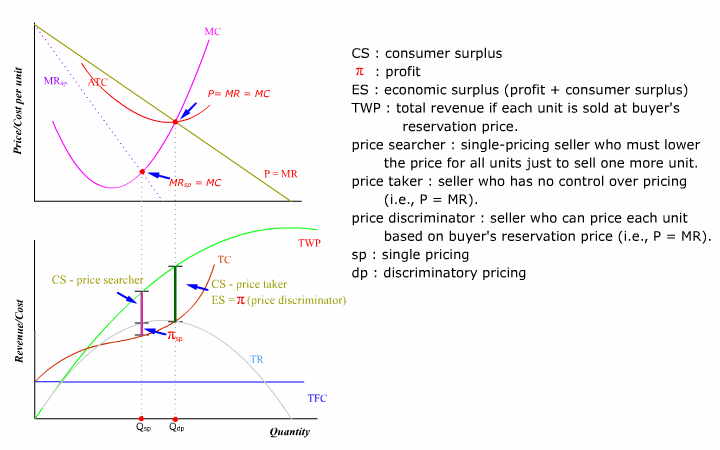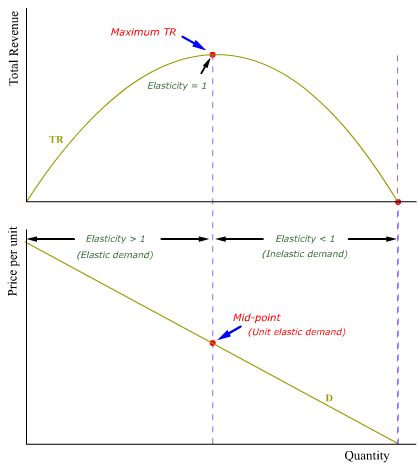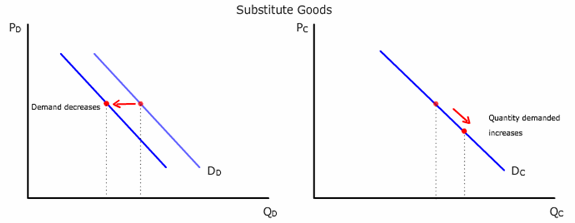Pricing and economic surplus
Pricing affects how economic surplus is distributed between consumers and producers and thus the incentive and resources to come up with innovative products.
Buyers are often asked to pay less than the maximum they are willing to pay (i.e., reservation price) for goods and services in order not to do without. This gap between what buyers are willing to pay and what they actually pay is known as consumer surplus.
Those buyers who can afford to pay the asking price but whose reservation prices are higher than the asking price are happy with this consumer surplus. But those who cannot afford the asking price but are willing to pay more than what it costs to produce another unit of the goods or services in question must do without. So the economy as a whole loses in terms of lower output.
The reason why some buyers can get away with paying less than their reservation prices is because of single pricing. That is, the same price is charged to everybody at a given level of output.
If sellers could charge each buyer according to his/her reservation price, there is no reason why the seller should stop selling more units as long as the additional revenue (marginal revenue) is higher than the additional cost (marginal cost). When each unit is sold at some buyer’s reservation price, pricing is said to be perfectly discriminating among buyers. Price discrimination leads to higher output, but only at the expense of consumer surplus since the gap between what buyers are willing to pay and what they actually pay disappears.
Whether the seller is single pricing or price discriminating, the seller keeps only the difference between what he receives as revenue and what he pays out as cost. Because the price-discriminating seller charges each buyer’s reservation price, the gap between total revenue and total cost is higher for the price-discriminating seller than the single-pricing seller at every level of output. So when each type of sellers is maximizing profit where additional revenue is just equal to additional cost (MR = MC), both the output level and the profit (i.e., TR – TC) level would be higher for the price-discriminating firm than the single-pricing firm.
Given the choice, most sellers would of course rather adopt price discrimination than single pricing. But price discrimination would be successful only if there are no close substitutes from competing sellers, and if buyers who pay less cannot easily resell what they purchase to those with higher reservation price.
Although sellers are interested only in profit, the economy should be concerned with the difference between what buyers are willing to pay and what it costs to produce the goods or service in question. This gap is known as the economic surplus. The economy as a whole is better off the higher the economic surplus is because a greater amount of value is produced. But it does make a difference who captures the economic surplus. When the surplus is captured by the monopolist single seller as profit, there are incentives and resources to come up with innovative products. On the other hand, when the economic surplus is captured entirely by consumers due to perfect competition with many small firms selling identical products at single prices that are uniform across sellers, little resources are left to invest in new products.
Given the current patent system that grants only a limited period of exclusive property rights to new products, there is a tendency for the economic surplus to migrate from the innovating monopoly firm to consumers as the new products gradually become homogeneous commodities produced by a few or many competing firms.
Glossary:
- economic surplusMarginal economic surplus is the difference between the reservation price (highest price one is willing to pay) and the marginal cost of a good. Total economic surplus is the sum of total consumer surplus and total economic profit. Total economic surplus is also the difference between TWP and TC. Under perfect price discrimination, economic surplus is maximized when profit is maximized. But under single pricing, maximizing profit does not generally maximize economic surplus.

- consumer surplusConsumer surplus is the gap between what buyers are willing to pay and what they actually pay. Consumer surplus is highest when sellers' economic profit is zero and is zero when sellers can practice perfect price discrimination (i.e., selling each unit at buyer's reservation price). See also "economic surplus."

- price discriminationCharging different customers at or close to their reservation prices for the same goods. Price discrimination is intended to increase sellers' economic profit and reduce consumer surplus.
- property rightThe control over the use or transfer of a resource. Property right is conducive to efficient use of scarce resources as owners have an incentive to maximize their long-term returns.
- reservation priceThe highest price a buyer is willing to pay rather than doing without.
- single pricingCharging the same price to all buyers regardless of their reservation prices in one pricing period. Those buyers whose reservation prices are higher than the single price will gain consumer surplus. All sellers who are not practicing perfect price discrimination are single pricers to various degrees. However, price takers individually have no power to change the single price. Only price searchers can adjust their single prices to take advantage of varying demand elasticities over prices.

- substitutesTwo goods (A and B) are substitutes when an increase in quantity demanded for A due to a price decrease of A leads to a decrease in demand for B and vice versa.

- commoditiesGoods that are so homogeneous that sellers have little or no pricing power.
- perfect competitionA market structure where barriers to entry and exit are absent. Sellers have no individual pricing power but must sell at the prevailing market price. At equilibrium, sellers just cover all costs and earn zero economic profit.
Topics:
Keywords
commodity, consumer surplus, economic surplus, innovative products, marginal cost, marginal revenue, monopoly, perfect competition, price discrimination, reservation price, single pricing
